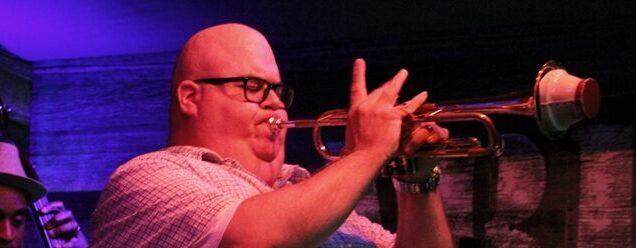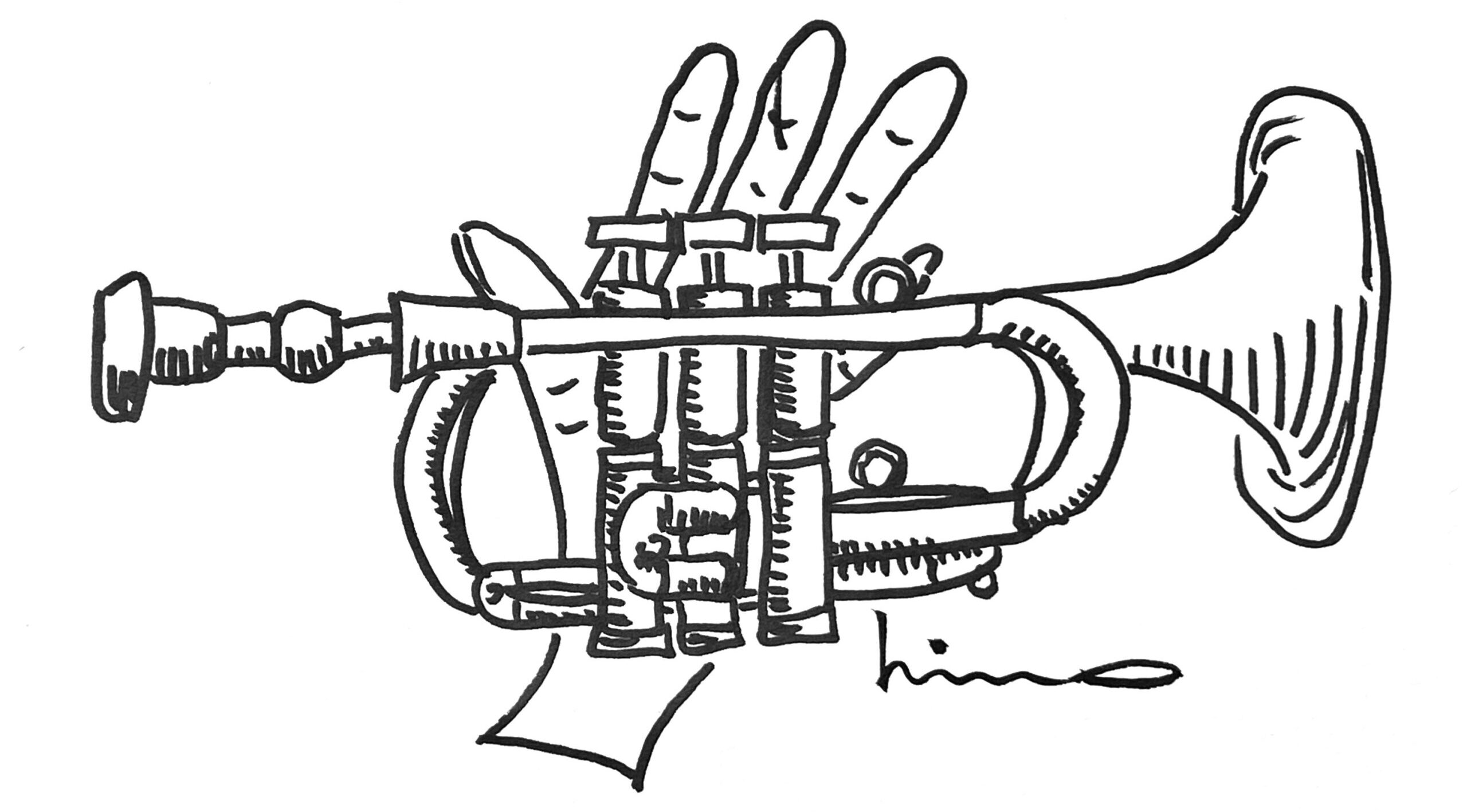Written by Dan Miller During 1960-1965, Freddie Hubbard recorded over fifty albums as a leader and sideman. While the personnel and scenarios of these sessions were wide ranging, Hub's beautiful sound and brilliant improvisations were always a perfect fit. With the possible exceptions of Louis Armstrong, Dizzy Gillespie, Donald Byrd and Lee Morgan--few trumpeters recorded as prolifically as Hub in such a brief span. Born in Indianapolis, Indiana on April 7, 1938--Freddie began playing the trumpet in junior high school. Indianapolis proved to be an excellent place for Freddie to hone his skills. He worked in many different groups, but it was his early relationship with Wes Montgomery that provided the platform for Hub's growth. Freddie moved to New York City in 1958, and immediately immersed himself into the scene. Influenced heavily by Fats Navarro, Miles Davis and Clifford Brown, Hubbard's own style had already begun to take shape. By the end of 1958, Freddie had recorded with John Coltrane on the albums Stardust (Prestige 7353) and The Believer (Prestige 7292). The beginning of 1959 saw Freddie record with Cannonball Adderley and the Wynton Kelly Trio on Paul Chambers’ Go! (Vee Jay 1014). In April of 1959, he began a two month stint with Sonny Rollins. Freddie then went to work with Charli Persip and Slide Hampton, recording with both. During his time with Slide Hampton's group, Freddie shared the trumpet solos with Booker Little (Burt Collins played lead). Booker made a very strong impression on Hub, and the two became fast friends. In 1960, he joined J.J. Johnson's sextet. This group included Cedar Walton and Clifford Jordan, and they produced a wonderfully swinging record for Columbia entitled J.J. Incorporated (Columbia 36808). It was in 1960, that he began his relationship with Blue Note Records. He recorded his debut as a leader, Open Sesame (BN 4040) on June 19th with Tina Brooks and McCoy Tyner. In turn, Hub would also play on Brooks' Blue Note debut True Blue (BN 4041) just one week later. J.J. Johnson disbanded shortly thereafter, and Freddie returned to Slide Hampton's group. Freddie recorded four albums as a leader in his first sixteen months at Blue Note (Open Sesame, Goin’ Up and Hub Cap), culminating with the masterpiece Ready For Freddie (BN 4085), recorded on August 21, 1961. This incredible recording features Wayne Shorter, McCoy Tyner and Elvin Jones and some of Freddie’s finest compositions including Crisis and Arietis. The tour de force performance on this record though is Birdlike, a majestic nineteen-chorus F Blues solo which is highlighted by the intense interplay between Hubs and Elvin. At the dawn of the 1960’s, Freddie Hubbard was the most highly sought after trumpet sideman in modern jazz. 1961 saw the death of Booker Little and the beginning of an eighteen month drug related hiatus for Lee Morgan. Hubs joined Donald Byrd and Kenny Dorham as Blue Note Records signature voices on trumpet. From 1960-1961, Freddie participated in a hugely wide–ranging series of recordings from straight ahead sessions like Hank Mobley’s Roll Call (BN 4058), Dexter Gordon’s Doin’ Alright (BN 4077) and Oliver Nelson’s Blues and the Abstract Truth (Impulse A-5) to the Avant Garde like Eric Dolphy’s Outward Bound (New Jazz NJ 8236), Ornette Coleman’s Free Jazz (Atlantic 1364) and John Coltrane’s Ole (Atlantic 1373). During the summer of 1961, Lee Morgan decided to leave Art Blakey's band. On Lee's recommendation, Freddie joined the Jazz Messengers (which would cement lifelong associations with Wayne Shorter and Curtis Fuller) establishing Blakey’s first sextet. The Messengers was a great outlet for Hub's improvisations and compositions and the group’s creativity and energy was only paralleled in the sixties by Coltrane, Miles and Monk’s groups. Freddie’s thoughts on Art Blakey: “After you play with him,” Hubbard observed succinctly, “it feels empty playing with most other drummers. He gives you so much support. It’s in the medium tempos,” Freddie Hubbard has pointed out, “that you can really separate the extraordinary drummers from the average ones. There’s no one meaner than Art in this kind of tempo. All I can say in words is that he gets right into the nitty gritty and stays there. There are times,” Freddie Hubbard says, “when Art is so much on fire that he almost drives you off the stand.” (1) Many classic albums came from this group (Blakey's first sextet), including Mosaic (BN 4090), Free For All (BN 4170) and Caravan (Riverside RLP 9438). During his tenure with Blakey, Hub continued to make his own albums, as well as frequently appearing as a highly sought after sideman on such historic dates as Bill Evans’ Interplay (Riverside RLP 9445), Eric Dolphy’s Out To Lunch (BN 4163) and Herbie Hancock’s Takin' Off (BN 4109) and Empyrian Isles (BN 4175). Speaking of his direction within the music, Freddie said, "So far as I can put into words, the way in which I'm most interested in going is Coltrane-like. I mean different ways of playing the changes so that you get a wider play of colors and of the emotions that those colors reveal." (2) Between January 1963 and February 1964, Hub did not record for Blue Note due to heavy touring with Blakey and a short relationship with Impulse Records. A tremendous album emerged from this association in January 1963 entitled The Artistry of Freddie Hubbard (Impulse AS-27). Enlisting Curtis Fuller, Tommy Flanagan, Art Davis, Louis Hayes and the elusive John Gilmore (who spent the majority of his brilliant career as a member of the Sun Ra Arkestra)--Freddie produced another brilliant offering. Freddie left the Jazz Messengers in late 1964 and Lee Morgan returned to the band after taking eighteen months to cleanse his mind, body and spirit and regain his strength. During 1964 & 1965, Hubs lent his artistry to a myriad of recordings with the most modern leaders of the mid-sixties including John Coltrane, Sonny Rollins, Wayne Shorter, Herbie Hancock, Sam Rivers, Bobby Hutcherson, Andrew Hill and Max Roach. He rounded out the decade recording for Atlantic Records. Freddie Hubbard made thirty-six Blue Note appearances, eight as a leader, from 1960-1965. Unlike Fats Navarro, Clifford Brown and Booker Little whose careers' were tragically cut short--Hubbard's brilliance was allowed to flourish to full fruition. "Some musicians don't seem to care about technique," Hubbard stated in 1964, "but to me, there's more in playing trumpet than just working to your own capacity. I want to keep developing, and I want to be able to play the whole range of the horn any time I feel like it. When a certain idea occurs to me, I want to be able to execute it. That's what I've been working on ever since I started playing. It's no use having a whole bunch of ideas floating around in your mind and then not being able to execute them."(3) (1) Nat Hentoff, Liner Notes: Ready For Freddie (2) Nat Hentoff, Liner Notes: Art Blakey’s Free For All (3) Leonard Feather, Liner Notes: Breaking Point Freddie Hubbard Blue Note Discography BN 4040 Freddie Hubbard--Open Sesame (June 19, 1960) BN 4041 Tina Brooks--True Blue (June 25, 1960) BN 4056 Freddie Hubbard--Goin' Up (November 6, 1960) BN 4058 Hank Mobley--Roll Call (November 13, 1960) BN 4059 Kenny Drew--Undercurrent (December 11, 1960) BN 4067 Jackie McLean--Bluesnik (January 8, 1961) BN 4073 Freddie Hubbard--Hub Cap (April 9, 1961) BN 4077 Dexter Gordon--Doin' Alright (May 6, 1961) BN 4085 Freddie Hubbard--Ready For Freddie (August 21, 1961) BN 4090 Art Blakey--Mosaic (October 2, 1961) BN 4104 Art Blakey--Buhiana's Delight (November 28 & December 18, 1961) BN 4109 Herbie Hancock--Takin' Off (May 28, 1962) BN 4115 Freddie Hubbard--Hub Tones (October 10, 1962) BN 4135 Freddie Hubbard--Here To Stay (December 27, 1962) BN 4163 Eric Dolphy--Out To Lunch (February 25, 1964) BN 4170 Art Blakey--Free For All (February 10, 1964) BN 4172 Freddie Hubbard--Breaking Point (May 7, 1964) BN 4175 Herbie Hancock--Empyrian Isles (June 17, 1964) BN 4186 Hank Mobley--Turnaround (February 5, 1965) BN 4194 Wayne Shorter--Speak No Evil (February 24, 1965) BN 4195 Herbie Hancock--Maiden Voyage (May 17, 1965) BN 4196 Freddie Hubbard--Blue Spirits (February 19 & 26, 1965) BN 4198 Bobby Hutcherson--Dialogue (April 3, 1965) BN 4206 Sam Rivers--Contours (May 21, 1965) BN 4207 Freddie Hubbard--Night of the Cookers Vol.1 (April 10, 1965) BN 4208 Freddie Hubbard--Night of the Cookers Vol.2 (April 9, 1965) BN 4213 Bobby Hutcherson--Components (June 10, 1965) BN 4217 Andrew Hill--Compulsion (October 3, 1965) BN 4219 Wayne Shorter--All Seeing Eye (October 15, 1965) BN 4252 Duke Pearson--Sweet Honey Bee (December 7, 1966) BN 4254 Lou Donaldson--Lush Life (January 20, 1967) BN 4267 Duke Pearson--The Right Touch (September 13, 1967) BN 4435 Hank Mobley--Straight No Filter (February 4, 1965) BN 459H2 Andrew Hill--One For One (February 10, 1965) BN 3054 Wayne Shorter--Soothsayer (March 4, 1965) BN 3055 Dexter Gordon--Clubhouse (May 27, 1965) BN 8178 Bobby Hutcherson--Spiral (April 3, 1965) BN 84451 Art Blakey--3 Blind Mice Vol.1 (March 1962) BN 84452 Art Blakey--3 Blind Mice Vol.2 (March 1962 & April 1961) Freddie Hubbard Non-Blue Note Recordings of the 1960's Wes Montgomery--The Montgomery Brothers And Five Others (December 30, 1957--Pacific Jazz 1240) John Coltrane--The Believer (December 26, 1958--Prestige 7292) John Coltrane--Stardust (December 26, 1958--Prestige 7353) Paul Chambers--Go (February 2-3, 1959--Vee Jay 1014) Slide Hampton--Slide! (Late 1959--Strand 1006) Slide Hampton--Sister Salvation (February 15, 1960--Atlantic 1339) Eric Dolphy--Quintet (April 1, 1960--New Jazz NJ 8236) Charli Persip--Charles Persip and the Jazz Statesmen (April 2, 1960--Bethlehem 3019) J.J. Johnson--J.J. Incorporated (August 1 & 3, 1960--Columbia 36808) Walter Benton--Out of This World (September 19, 1960--Jazz Land 28) Randy Weston--Uhuru Afrika (November 17 & 18, 1960--Roulette SR 65001) Curtis Fuller--Boss of Soul Stream Trombone (December 1960--Warwick 2038) Ornette Coleman--Free Jazz (December 21, 1960--Atlantic 1364) Oliver Nelson--Blues and the Abstract Truth (February 23, 1961--Impulse A-5) Quincy Jones--The Great Wide World of Quincy Jones: Live! (March 10, 1961--Mercury 60221) Jimmy Heath--The Quota (April 14 & 20, 1961--Riverside RLP 372) John Coltrane--Ole (May 25, 1961--Atlantic 1373) Duke Pearson--Dedication! (August 2, 1961--Prestige 7729) Wayne Shorter--Wayning Moments (November 2 & 6, 1961--Vee Jay 3029) Curtis Fuller--Soul Trombone (November 15-17, 1961--Impulse A-13) Quincy Jones--The Quintessence (December 18, 1961--Impulse A-11) Jimmy Heath--Triple Threat (January 4 & 17, 1962--Riverside 9400) Benny Golson--Pop + Jazz = Swing (April 1962--Audio Fidelity AFSD 5978) Slide Hampton--Drum Suite (April 5, 19 & 18, 1962--Epic) Curtis Fuller--Cabin In The Sky (April 24-25, 1962--Impulse A-22) Freddie Hubbard--Artistry of Freddie Hubbard (July 2, 1962--Impulse AS-27) Bill Evans--Interplay (July 16, 1962--Riverside RLP 9445) Art Blakey--Caravan (October 23, 1962--Riverside RLP 9438) Freddie Hubbard--The Body and Soul (March 8 & 11 & May 2, 1963--Impulse AS-38) Art Blakey--Ugetsu (June 16, 1963--Riverside RLP 9464) Ronnie Matthews--Doin' The Thang (December 17, 1963--Prestige 7303) Art Blakey--Golden Boy (1963--Colpix 478) Art Blakey--Kyoto (February, 20 1964--Riverside RLP 9493) Quincy Jones--Soundtrack: The Pawnbroker (February 20, 1965--Mercury 21011) Art Blakey--Soul Finger (May 12-13, 1965--Limelight 82018) John Coltrane--Ascension (June 28, 1965--Impulse A-95) Max Roach--Drums Unlimited (October 14 & 20, 1965 & April 20, 1966--Atlantic 1467) Sonny Rollins--East Broadway Rundown (May 9, 1966--Impulse 9121) Freddie Hubbard--Backlash (October 19 & 24, 1966--Atlantic 1477) Booker Ervin--Booker & Brass (September 12-14, 1967--Pacific Jazz 20127) Freddie Hubbard--High Pressure Blues (November 13, 1967 & January 10, 1968--Atlantic 1501) Freddie Hubbard--Soul Experiment (December 11 & 13, 1968 & January 21, 1969--Atlantic 1526) Freddie Hubbard--Black Angel (May 16, 1969--Atlantic 1549) Quincy Jones--Walking In Space (June 18-19, 1969--A&M 93023) George Benson--The Other Side of Abbey Road (Oct 22-Nov 5, 1969--A&M 3028) Freddie Hubbard--The Hub of Hubbard (December 9, 1969--MPS 726) Photo courtesy of: Francis Wolff / Mosaic Images Back to top © 2008 Dan Miller All materials and information (unless otherwise noted) property of Dan Miller

